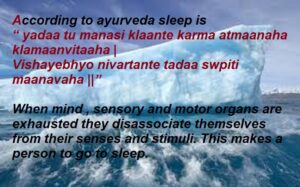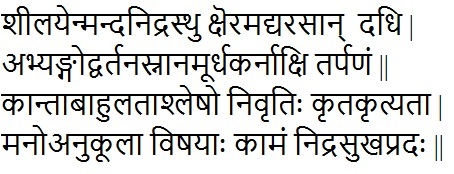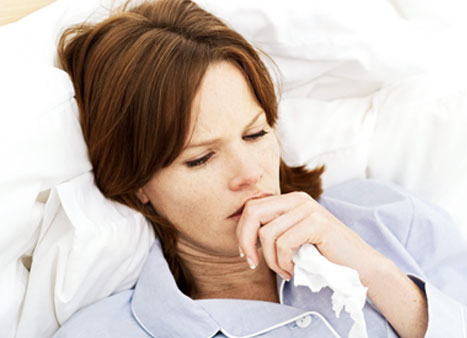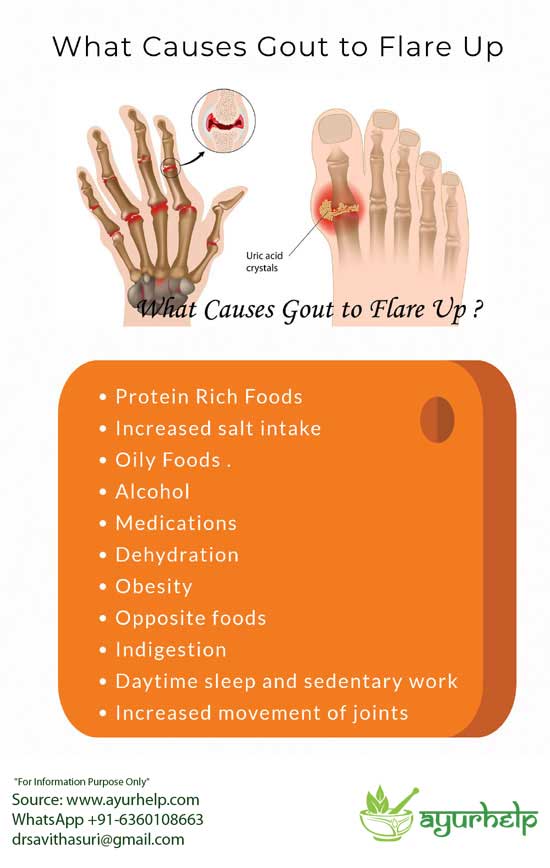Ayurveda emphasizes good sleep at night as it rejuvenates the body and mind. Various ayurvedic tips, remedies, treatments, and medicines help with insomnia and induce good sleep.
Table of content
What does Ayurveda say about Good Sleep?
Causes of Insomnia or Not Getting Deep Sleep
Benefits of good sleep – Ayurveda View
Effects of Insomnia or Not getting good sleep
Best Ayurvedic Medicine and Home Remedies for sound sleep.
What does Ayurveda say about Good Sleep?
Sleep is a physical and mental resting state of a person. During sleep, he becomes inactive and will not be aware of the surrounding environment. His senses do not respond to external stimuli.
According to Ayurveda sleep is
“ yadaa tu manasi klaante karmaatmaanaha klamaanvitaaha |
Vishayebhyo nivartante tadaa swpiti maanavaha ||”
When mind, sensory, and motor organs are exhausted they disassociate themselves from their senses and stimuli. This makes a person go to sleep.
Texts of Ayurveda explain the importance of good sleep as follows

A bad sleeping pattern causes unhappiness, loss of body weight and strength, klaibya or erectile dysfunction, low libido, loss of memory, and lowered immunity.
A good sleeping pattern enhances happiness, increases immunity and body strength, boosts sexual function and libido, and improves memory and intelligence.

Many victims have invested so much in sleep enhancement drugs, yet they are not getting it right in terms of achieving the desired results. However, this content has been put together to suggest some natural and ayurvedic home remedies which are at your disposal to induce a good night’s sleep. Let’s look into them one after the other.
Causes of Insomnia or Not Getting Deep Sleep
Insomnia is a condition in which a person will be having trouble getting good sleep. The term “Anidrata” is used in texts of Ayurveda to describe this condition.
Insomnia or sleep disorder is defined as “difficulty falling asleep”. People with Insomnia or sleeplessness suffer from various symptoms. They feel it difficult to fall asleep. Sometimes they wake in the middle of sleep and find it difficult to fall asleep later. Many of those who suffer from sleep disorders feel tired after waking up. Even waking up too early in the morning is a sleep disorder.
Many factors such as stress workload, health issues, energy drinks, technology, and much more have been attributed as reasons for sleeplessness. It is expected that after a time at work that involves many logical tasks, stresses, and other job activities that are supposed to aid your quick rest at night, you find it difficult to give in to bed. This tends to result in insomnia.
Stress from a job or stress due to family matters can cause acute insomnia or temporary sleeplessness which gets cured as soon as the stress factor is solved.
Emotional discomforts like grief and physical discomforts like pain, blocked nose, cough, fever, etc may also cause sleeplessness for a short period.
Changing the place of sleep, bright light, noise, extreme temperatures, jet lag, working in shifts, etc can lead to acute insomnia.
Lifestyles like watching television before going to bed, viewing smartphones during sleeping hours, consuming a heavy meal during sleeping hours, and drinking caffeinated beverages can also cause sleeplessness. If these lifestyles are continued for a long time chronic insomnia may set in.
Chemotherapy and radiation therapy which are used for treating cancer may also cause temporary insomnia
Long-standing stress, anxiety, and depression may become reasons for Chronic Insomnia.
According to Ayurveda Insomnia is caused due to fear, anxiety, anger, overexertion (physical and psychological), fasting, uncomfortable bed, diseases like colic pain, etc. Panchakarma which has not been performed methodically may also lead to insomnia. Vitiated Vata Dosha causes sleeplessness.
Benefits of good sleep – Ayurveda View
To maintain good health, the National Sleep Foundation recommends an average of 7 to 8 hours of sleep a night. However, current research shows that an average person sleeps for just 4 to 5 hours a night while about 10 to 15% of individuals are suffering from insomnia. This has been associated with some adverse effects such as heart disease, weight gain, immunity reduction, and diabetes on the overall health of the victims.
According to Ayurveda sleep has both beneficial and harmful effects depending on sleeping time and duration. Good sleep nourishes the body and strengthens it. It increases memory power, knowledge, virility, and longevity. Untimely sleep leads to unhealthy conditions and reduces longevity.
A good 6-7 hrs of sleep is necessary to keep our body healthy. People who sleep less than 6-7 hours are at risk of developing diseases. The benefits of sleep are as follows
1. It keeps our hearts healthy
2. It Reduces stress and calms the mind.
3. Good sleep helps to reduce pain and inflammation
4. Body repairs its tissues in sleep.
5. 6-7 hours of sleep boosts memory power and increases alertness.
6. It helps to overcome depression
Effects of Insomnia or Not getting good sleep:
- Sleeplessness leads to indigestion,
- Body pain,
- Lowered immunity,
- The reduced span of attention, Ability to learn, remember, and concentrate are affected. Low memory power and Delayed reflexes.
- Erectile dysfunction and Loss of Libido.
- Fatigue and Lowered energy levels
- Depression and Mood swings
- Increased blood pressure.
- Cardiac risks etc.
- Dark circles ( Read Under Eye Circles – Ayurvedic Tips ) under eyes.
- Dry skin.
- The appearance of wrinkles on the skin.
- Hair loss or hair fall.
Daytime sleep in Ayurveda:
Ayurveda acharyas advise not to sleep in the daytime. Good sleep at night always keeps the body healthy. But in a few unavoidable health conditions and in conditions where doshas are imbalanced daytime sleep is advised by Ayurveda vaidyas. Here is a list of health conditions in which daytime sleep is advised.
- A person who exercises well and exerts physically can sleep in the daytime. He needs this rest to balance his energy level and allow his strained tissues to recover.
- People who indulge in increased sexual activities can sleep in the daytime. A lot of energy is spent on sexual activities. This leads to the loss of shukra dhatu or shukra kshaya. During daytime sleep, the lost energy and shukra dhatu get replenished. Or else he or she may land into conditions like low libido and fatigue. If men who indulge in increased sexual activities do not take a nap in the daytime, they may land into conditions like erectile dysfunction, decreased semen volume, low sperm count, and low sperm motility.
- Persons who walk very long distances have to sleep in the daytime. This allows them to recover lost energy and also rejuvenate injured tissues.
- Individuals who have been afflicted by diseases like diarrhea, indigestion, stomach pain, wheezing, and diseases of Vata can take a daytime nap.
- Children, the elderly, night shift workers , and people who fast, have to sleep in the daytime.
Best Ayurvedic Medicine and Home Remedies for sound sleep.
People don’t believe that they can get the best result from having a nice rest without investing in sleeping aid supplements or alcohol every day. Before a sleepless night turns into a real nightmare for you and you start patronizing drugstores, here are some remedies you can try at your home for the best results:
Ashwagandha:
The Herb ashwagandha helps to reduce stress and acts as an adaptogen and an excellent rejuvenator. (rasayana). Many have given feedback about this herb, saying that it helps them to get a good night’s sleep. this can be taken in form of capsules or powder. Ashwagandha with milk (ashwagandha ksheerapak) ( Read Ashwagandha Ksheerapaka – Moon Milk or Ashwagandha Milk Benefits ) can be taken at night for a sound sleep.
Ayurveda acharyas recommend the following tips and treatments to get good sleep.

Sleep-inducing natural ayurvedic drinks
Drinking hot soups of meat or vegetables with fewer spices helps to get good sleep. Eating curd/ dahi/yogurt which is not too sour (amla rasa), also improves sleeping hours.
Drinking warm turmeric milk with a teaspoon of ghee helps to get a very good sleep. This drink also promotes bowel movement in the morning and relieves constipation.
Having a cup of drink can go a long way in helping you to fall and stay asleep. However, taking alcohol is not the best solution to falling asleep as some people thought. Alcohol has been discovered to keep you awake when your system consumes the intoxicating substance in the appropriate content. However, sipping a glass of warm milk will give you what you want. The sleeping-inducing amino acid tryptophan in the milk has been claimed to aid your falling asleep. Try to keep it warm as people see the warmth as calming and relaxing to help them relax both mentally and physically. Add this routine to your diary of home remedies to have a good sleep.
Get a head massage, foot massage, and warm bath:
Take a head Massage with Vata dosha balancing oils like sesame oil or coconut oil at night.
Massaging the whole body and head with warm pure sesame oil or ksheerabala oil and a good hot water bath makes you have a good night’s sleep.
Instilling pure warm castor oil drops to ears and eyes are the other methods that help to induce sound sleep.
Massage your foot with warm oil and take a foot bath in warm water for 15 minutes.
Taking a warm bath before going to bed is another wonderful natural home remedy for good sleep. Sinking yourself in a warm bathtub to wash the day’s stresses from your body makes you feel relieved and cleaned as well as reduces the temperature of your body to have good sleep. With the addition of your favorite lavender, you are guaranteed of having an aromatherapy rest throughout the night.
Have sex and hugs
Hugging loved ones and remembering happy moments is the best remedy for insomnia.
Good sexual intercourse is the best therapy for Insomnia or sleeplessness.
For this keep your bedroom clean. The bedroom is described as a place where one takes a rest. If you want to have a good sleep, your bedroom is expected to be well conducive to its purpose. Ensure your bedroom is put in place to condition your mind and body to sleep. Your bedroom shouldn’t be a place to erect your T.V. or set up your reading tablet, computer, or video game. All these items not only take your time and keep you awake, but they are robbing you of your entitled relaxation. Your bedroom should not be your second office where you complete your daily office work. All these electronics and activities in the bedroom make your bedroom a stress zone, and it cannot aid you to sleep as is needed. Now, that you want a good sleep every night, T.V., computer, reading table, and other related components must go, to make your bedroom a bedroom.
Changing sleep Pattern
Do not sleep in day time if you are not getting good sleep at night. Daytime sleep can cause sleeplessness at night. But elder people, children, patients, pregnant women, lactating mothers, and physically very active persons like athletes are exceptions to this.
Yoga, Meditation, and Exercise:
Meditate for 15 minutes before going to bed. Practice yoga to normalize sleep.
Select an easy yoga routine that does not require much power to stretch your body right in your bed. This is just to energize you in place of acupuncture. Then take some time to meditate and free your mind of any form of thoughts of what has happened during the day. After this, close your eyes for 6 to 9 nine minutes without paying attention to anything except your breathing.
Another home remedy to quickly lure you to good sleep is exercise. Exert yourself with good exercises in the morning. These exercises in turn help to get a good sleep at night. Indulge in regular exercise, and you will experience better rest. Regular exercise benefits you not only to help you sleep better but also helps you gain more energy for next-day activities. This is true because regular exercise has been discovered to enhance better sleep, resulting in more energy when you wake up. However, exercise during the day has been shown to be the best in achieving a better result of good sleep. A brisk walking for 45 minutes is an excellent daytime exercise
Diet
Eat food – 3 hours before going to bed. Avoid caffeinated beverages in the late evenings. Reduce consumption of alcohol and smoking cigarettes. Avoid the consumption of oily foods at night. Consume warm light food like rice and milk before going to bed. Do not eat curd (yogurt) at night.
Other Tips to Get Deep Sleep
Backward logical counting:
If you lay your head but find it difficult to fall asleep, try the logical-count system. It has been found to work. The principle of backward counting is very easy. Try to count down from 600 in multiples of nine. You will discover that this is a mathematical task and a little bit complex off-hand. This task compels your brain to divert your attention from your worries and helps you focus on something else. This may sound odd but try it.
Use Acupuncture:
The use of acupuncture as a home remedy to get a good sleep cannot be over-emphasized among the Chinese and it has found its way into the world of today. Acupuncture is one of the oldest key components for healing practices utilized in Traditional Chinese Medicine (TMC). Its working principle is claimed to stimulate specific points to control the life force or energy balance by widening channels referred to as meridians in your body that block whenever stress intensifies and contracts vessels. However, the thin needles in acupuncture, when in use, open up these close-off channels to trigger your brain to acknowledge that it is time to go to bed and have a rest. This also stimulates the release of neuro-endocrine chemical such as melatonin or tryptophan to help you fall and have a good sound sleep. Try acupuncture today.
Ayurvedic medicines for a deep good night sleep
Ayurvedic medicinal herbs like
- Bramhi (manduka parni or gotukola) or Gotu Kola or Centella Asiatica ,
- Shankhapushpi
- Ashwagandha ,
- Turmeric ,
- Tulsi etc promote sleep.
- Using ashwagandha capsules along with our hair oil which is processed with these herbs helps to promote good sleep. Take one capsule of ashwagandha at night and massage your head with warm hair oil at night.
The above home remedies for healthy sleep are found to be natural and will not cost you anything to achieve in the comfort of your home. It has not reached the level of endorsing every drugstore around you to have a good sleep. Everything you need to do to achieve the best result is right there at your disposal. Try them and come back here to tell me the outcomes. In my next articles, I will be discussing many other health issues to ensure you live healthy lifestyles. Stay tuned!
(WhatsApp Dr.Savitha Suri @+ 91 6360108663/ to know more about ayurvedic treatment and remedies )
Author: Dr. Savitha Suri Consultant Ayurvedic Physician
Call us at +91 9945995660 / +91 9448433911
WhatsApp + 91 6360108663/






